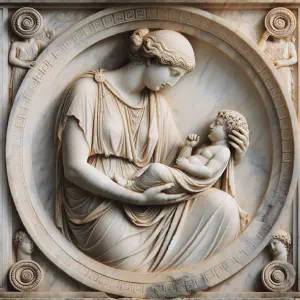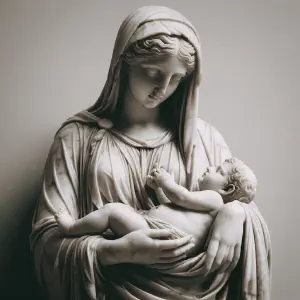The Dawn of Redemption



In these events, the threads of prophecies and promises wove together, heralding a new era. The faithful saw in John the dawn of redemption, the beginning of the fulfillment of ancient promises. As they witnessed these signs, a question lingered in their hearts, “What, then, will this child be?” The hand of the Lord was with him, and through him, the world was about to witness the unfolding of divine mercy and the keystone of salvation.
Five Questions
How does the prophecy in Malachi relate to the New Testament and the arrival of Jesus?
The prophecy in Malachi is a pivotal link between the Old and New Testaments. It sets the stage for the coming of Jesus by introducing the figure of a messenger, traditionally interpreted as John the Baptist, who prepares the way for the Lord. This messenger’s role is crucial in purifying and preparing the people for Jesus’ teachings and ministry, fulfilling God’s promise of salvation and redemption.
What significance does the naming of John the Baptist hold in the Gospel of Luke?
In Luke’s Gospel, the naming of John the Baptist breaks with tradition, symbolizing a new beginning and God’s intervention in history. It’s not just a familial or social decision but a divine directive. This act signifies that John’s life and mission are ordained by God, separate from human expectations, and integral to the unfolding of God’s salvific plan.
The Psalm talks about lifting heads to see redemption. How does this imagery enhance our understanding of God’s salvation?
This imagery in the Psalm is metaphorical, urging us to be vigilant and hopeful. Lifting our heads symbolizes looking beyond our immediate circumstances and recognizing God’s hand at work. It’s a call to awareness and expectation, reminding us that God’s plan of salvation is active and ongoing, and we are invited to participate in this divine mystery with faith and hope.
In Malachi, the imagery of refining fire and fuller’s lye is used. What does this tell us about God’s way of preparing us for His coming?
The imagery of refining fire and fuller’s lye in Malachi suggests a process of purification and transformation. Just as fire purifies metals and lye cleanses garments, God’s presence and action in our lives refine and purify our spirits. This process, often challenging, is essential for making us ready to receive and participate in God’s divine plan, helping us grow in holiness and righteousness.
How do these readings collectively convey the theme of God’s intervention in human history?
Collectively, these readings emphasize the theme of God’s active and purposeful intervention in human history. From the prophecy of a messenger in Malachi to the miraculous birth and naming of John the Baptist in Luke, and the call for spiritual vigilance in the Psalm, we see a continuous narrative of God reaching out to humanity. These scriptures reveal a God who is not distant but intimately involved in the unfolding of salvation history, guiding, purifying, and redeeming His people.
Bible Study
Malachi 3:1-4, 23-24
Thus says the Lord GOD:
Lo, I am sending my messenger
to prepare the way before me;
And suddenly there will come to the temple
the LORD whom you seek,
And the messenger of the covenant whom you desire.
Yes, he is coming, says the LORD of hosts.
But who will endure the day of his coming?
And who can stand when he appears?
For he is like the refiner’s fire,
or like the fuller’s lye.
He will sit refining and purifying silver,
and he will purify the sons of Levi,
Refining them like gold or like silver
that they may offer due sacrifice to the LORD.
Then the sacrifice of Judah and Jerusalem
will please the LORD,
as in the days of old, as in years gone by.
Lo, I will send you
Elijah, the prophet,
Before the day of the LORD comes,
the great and terrible day,
To turn the hearts of the fathers to their children,
and the hearts of the children to their fathers,
Lest I come and strike
the land with doom.
This passage from Malachi prophesies the coming of a messenger, likely interpreted as John the Baptist, who prepares the way for the Lord. The refiner’s fire and fuller’s lye imagery signify purification and preparation for the Lord’s arrival, aligning with Catholic teachings on penance and purification. It also introduces Elijah, a key figure in Jewish tradition, as a harbinger of the ‘great and terrible day of the Lord,’ emphasizing the importance of repentance, a core Catholic value.
Psalm 25:4-5ab, 8-9, 10, and 14
R. (see Luke 21:28) Lift up your heads and see; your redemption is near at hand.
Your ways, O LORD, make known to me;
teach me your paths,
Guide me in your truth and teach me,
for you are God my savior.
R. Lift up your heads and see; your redemption is near at hand.
Good and upright is the LORD;
thus he shows sinners the way.
He guides the humble to justice,
he teaches the humble his way.
R. Lift up your heads and see; your redemption is near at hand.
All the paths of the LORD are kindness and constancy
toward those who keep his covenant and his decrees.
The friendship of the LORD is with those who fear him,
and his covenant, for their instruction.
R. Lift up your heads and see; your redemption is near at hand.
Psalm 25 is a prayer for guidance and deliverance, reflecting a deep sense of humility and trust in God. The Psalmist, traditionally believed to be David, seeks God’s truth and salvation, underscoring the Catholic value of seeking divine wisdom and living in accordance with God’s will. The passage resonates with the Catholic emphasis on God’s mercy, the importance of following His decrees, and the special relationship with those who fear (revere) Him, aligning with the Beatitudes and the Acts of Mercy.
Luke 1:57-66
When the time arrived for Elizabeth to have her child
she gave birth to a son.
Her neighbors and relatives heard
that the Lord had shown his great mercy toward her,
and they rejoiced with her.
When they came on the eighth day to circumcise the child,
they were going to call him Zechariah after his father,
but his mother said in reply,
“No. He will be called John.”
But they answered her,
“There is no one among your relatives who has this name.”
So they made signs, asking his father what he wished him to be called.
He asked for a tablet and wrote, “John is his name,”
and all were amazed.
Immediately his mouth was opened, his tongue freed,
and he spoke blessing God.
Then fear came upon all their neighbors,
and all these matters were discussed
throughout the hill country of Judea.
All who heard these things took them to heart, saying,
“What, then, will this child be?
For surely the hand of the Lord was with him.”
This Gospel passage narrates the birth and naming of John the Baptist, son of Elizabeth and Zechariah. It highlights God’s intervention in human history and the fulfillment of His promises. John’s role as the precursor to Jesus aligns with Catholic teachings on prophecy and divine mission. His naming, which breaks from tradition, signifies God’s sovereignty and the new covenant, in line with Catholic beliefs in grace and divine providence. The amazement of the neighbors and Zechariah’s regained speech demonstrate God’s power, aligning with the belief in miracles and God’s active presence in the world.
Lessons
The selected readings beautifully converge to illustrate the profound nature of God’s plan for redemption. In Malachi, we see the foretelling of a messenger who will prepare the way for the Lord, symbolizing the purifying and transformative power of God’s arrival. The Psalm reinforces this theme, urging us to seek God’s guidance and wisdom, acknowledging His just and merciful nature. The Gospel of Luke, with the birth of John the Baptist, signifies the fulfillment of these prophecies, highlighting the miraculous workings of God in human history. These scriptures collectively teach us the importance of faith, the certainty of God’s promises, and the transformative power of divine intervention in our lives. They call us to be attentive to God’s guidance, to embrace humility, and to trust in His eternal plan for salvation.
Meditation Prayer


